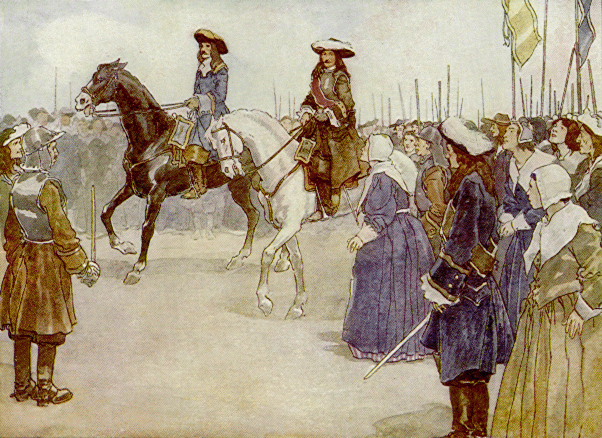



|
A NY one could see that the people were everywhere ready for rebellion. The King alone would not see it and went on in his own way. He was angry and sullen, but very obstinate. "I will not give way," he said, "my father lost his head by giving way," and he resolved to punish the people.
But James had gone too far. The people were weary of a
Popish tyrant, and they made up their minds to have a
Protestant King. So they asked William, Prince of Orange, to
come to rule over them, the Prince against whom
Charles I. had a daughter called Mary. She married a Prince
of Orange called William, and their son, also called
William, was now Prince of Orange. He was thus the nephew of
Although their father, James, was a Roman Catholic, Mary and her sister, Anne, were both Protestants, and except for their little brother, who was at this time a tiny baby, Mary was the next heir to the throne of Britain.
So when the British saw that James meant to rule as a tyrant and that there was no hope of any freedom or happiness for them as long as he was King, they sent messages to Holland begging William to come to take the crown.
William consented to come, and began to gather his ships and
men. And one day a letter reached James telling him what the
Prince of Orange was doing. As James read, he turned pale
and the letter dropped from his hand. He had thought that he
might
William was ready to sail, but for some days he was prevented because of the wind which blew from the west. At last it changed, and what was known for many years after as the "Protestant East Wind" began to blow.
It blew the Prince and his great fleet to the shores of
Britain. More than six hundred ships swept over the water,
led by William in his vessel called the Brill. From the
Once before in our story a great conqueror called William had sailed to these shores with mighty ships and men. This was no conqueror, but a deliverer.
On the 5th of November
Through rain and wintry weather, over roads
As he rode along an old woman pushed her way through the crowd, and afraid neither of the prancing horses nor the drawn swords of the soldiers, darted to the side of the Prince. She seized his hand, and, looking up into his face with eyes full of tears, cried, "I am happy now, I am happy now." And the grave and stern William smiled gently as he looked down upon her. The Deliverer had come.

The Deliverer had come. |
James II., his Queen, and their little boy fled to France. No one wanted James, no one regretted him. To go to France was the best thing he could do, and the King there received him kindly and treated him as an honoured guest.
At Westminster a Parliament was called, which arranged that William and Mary should be King and Queen together. For although Mary had the better right to the throne she did not wish to reign without her husband, nor did he wish to accept a lower rank than that of his wife.
So ended the "Glorious Revolution." It had been brought about with hardly any fighting at all, and the war between the King and Parliament was at an end, for William and Mary received the throne by the will of Parliament.